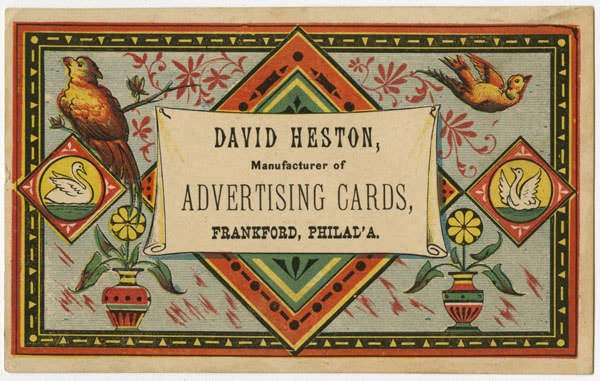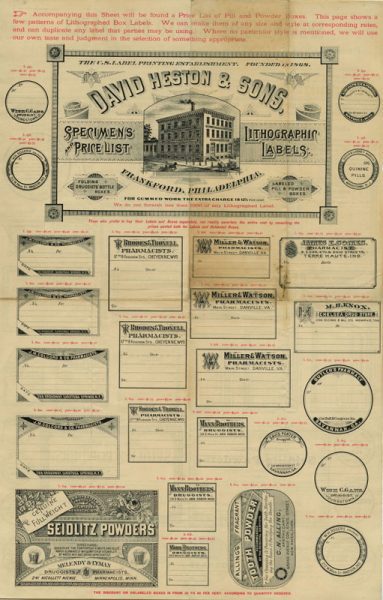Curator’s Favorite: David Heston, Frankford Printer

David Heston, Manufacturer of Advertising Cards, Frankford, Phil’a.
(Philadelphia, ca. 1880). Color wood engraving.
Research on this circa 1880 trade card for Philadelphia printer David Heston, a recent purchase for our visual culture collections, led to interesting discoveries about his life and career. Born in Bucks County in 1827, Heston not only operated a printing establishment, but was also a respected Quaker minister.
Designed in a style known as “artistic printing,” the colorful trade card advertises the business, also known as “The U.S. Label Printing Establishment,” started by Heston in 1868. However, imagery alone was not used to promote Heston. Text evoking what could be described as a religious zeal necessary for ministerial work was also employed. On the verso of this charming card, Heston exhorts “Advertising cards are undoubtedly just the thing to effectually gain, and as it were, fix the attention of the public, and if circulated energetically, and persisted in for a length of time, will do much towards building up and establishing an extensive trade.”

David Heston & Sons, Frankford, Philadelphia. Specimens and Price List, Lithographic Labels. (Philadelphia, ca. 1890). Lithograph.
The trade card adds to a small, but engaging body of material we hold by Heston. A near half-dozen of his designs reside in our trade card collections, augmented by a few printing specimens/price lists such as this one from about 1890. Created to advertise the variety of pharmaceutical labels available for purchase from the firm, the list also shows a view of the David Heston & Sons factory at 1525 Orthodox Street in Frankford. The image, atypical for such a circular, is smartly embellished with pictorial details representative of his label and trade card work. Heston had recently partnered with his three sons in the business and perhaps this was the impetus for employing the view of the factory. The firm operated from the location until at least the mid 1920s, before relocating to 1208 Race Street by 1936.
Although the trade cards in our collection promote Heston’s work as a printer, he was also active in box manufacturing through the firm Brown, Heston & Co. from 1886 to 1889, as well as inventing improvements to tools and equipment used in his various trades. From 1874 to 1881, he received several patents for innovations related to bronzing and paper-cutting machinery, a chromatic printing press, and box manufacture. In addition, he was likely the David Heston of Philadelphia who received patents for a shaving mug and a typewriter.
Not a man to rest on his laurels, in 1888 Heston also incorporated the American Color Printing Machine Company. In addition, he continued in the printing trade and to apply for patents until a few years before his death in March 1905. Despite all of these achievements, tellingly, his obituary in the Philadelphia Inquirerfocused on his work as a minster, and not as a printer or inventor.
As so often happens with ephemera, a larger story has emerged from a seemingly minor artifact. The energy and enterprising nature Heston advocated through our recent acquisition holds true for the man himself, as evident from his numerous endeavors.
Erika Piola
Associate Curator, Prints and Photographs
Co-director, VCP at LCP
